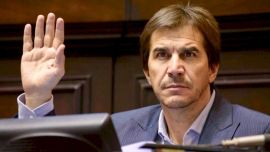President Alberto Fernández has called for a “restructuring of multilateralism” across the Americas, criticising institutions and models that prioritise the views of Washington to the detriment of other nations.
Addressing the Summit of the Americas in Los Angeles on Thursday, Argentina’s leader delivered a combative and critical speech that slammed US President Joe Biden’s decision to exclude Cuba, Nicaragua and Venezuela from the regional meeting, arguing instead that “dialogue and diversity is the best way to promote democracy.”
Fernández expressed regret that “not all nations that should be here are present” and said that regional relations would’ve been served better by a “united” Americas “without exclusions.”
“Being a host country does not grant the ability to impose a right of admission,” said the president, criticising the US president directly.
“So that this does not happen again, I would like to make it clear for the future that the fact of being the host country of the Summit does not grant the ability to impose a 'right of admission' on member countries of the continent,” he proposed.
Concerns
The president also called for a new leader to head the Organisation of American States (“The OAS has been used as a gendarme that facilitated a coup in Bolivia,” said the president) and declared that regional institutions and development banks should be reorientated to reflect greater representation for nations across the region.
Expressing concerns over the informal labour sector and inequalities, the president also called on a resetting of the global order, removing the “unequal” rules imposed by the international financial system.
The region “has emerged from the pandemic with the greatest amount of external debt,” he highlighted.
“From the sidelines, where we are placed, we are pained to see the suffering of our brother and sister countries,” he added, slamming trade embargoes against Cuba and Venezuela that “condition” governments.
Speaking as the pro-tempore president of the CELAC (Community of Latin American and Caribbean States) regional bloc, the president said that while “we have different viewpoints, we share similar concerns.”
In a brief eight-minute speech, the Peronist leader also found time to reiterate Argentina’s sovereignty claim over the disputed Malvinas (Falkland) Islands and slam the Donald Trump administration for backing Argentina’s 2018 record US$57-billion credit-line with the International Monetary Fund.
The intervention of the Trump government was decisive in facilitating an unsustainable debt in favour of an Argentine government in decline, said the president, pointing the finger at the2015-2019 Mauricio Macri administration. “It was incurred with the sole purpose of preventing what ended up being the electoral triumph of our political force. Such indecency is suffered today by the Argentine people,” he added.
Moving on, Fernández chose to quote Pope Francis and Juan Domingo Perón.
“We must build together, in unity, a renewed humanism, which, as Pope Francis teaches, begins with the least of us to reach everybody,” he said to the over 20 heads of state present.
“United or dominated. United by the ‘common home’ or dominated by economic greed. United by multilateralism or dominated by polarisation. United by democracy with social inclusion or dominated by individualism and collective misery,” he expressed, in reference to a speech by Perón given on November 11, 1953.
His final words were also for the US president. “President Biden, I’m here trying to build bridges and bring down walls. As president of CELAC, I want to invite you to participate in our next plenary meeting. I dream of the Americas fraternally united, we commit ourselves to all human beings inhabiting our continent having the right to bread, land, housing and a decent job.”
Greeting
Thursday’s remarks came a day after the president attended the Inaugural Ceremony of the Ninth Summit of the Americas, hosted this year by the United States government. Accompanied by First Lady Fabiola Yáñez, the Peronist leader was received by his US counterpart and the Democrat’s wife Jill Biden.
During a brief greeting at a red carpet photocall event, Argentina’s first couple then showed the occupants of the White House a photograph of their baby son Francisco via the Peronist leader’s mobile phone.
Fernández, who included Foreign Minister Santiago Cafiero and Congress Speaker Sergio Massa in his travelling party, sculpted his speech with the assistance of Strategic Affairs Secretary Gustavo Beliz, reporters said.
The speech, described beforehand as "rational and sensible" by Cafiero, sought to thread a balance between criticising Washington’s decision to exclude nations on democratic grounds while praising Biden ahead of a key meeting in the US Capitol next month.
The president had previously expressed his rejection of the decision not to invite the leaders of Cuba, Nicaragua and Venezuela. Washington has sought to exclude those three nations from the summit given its concerns over the state of democracy in the troubled nations and the authoritarian nature of their governments.
As recently as a month ago, Argentina’s president had called on the summit’s organisers to “avoid exclusions that prevent all voices of the hemisphere from dialoguing and being heard.”
While in Los Angeles, Argentina’s leader was due to hold bilateral meetings with Canadian Prime Minister Justin Trudeau, and the Secretary-General of the United Nations, António Guterres, on the sidelines of the summit.
Notably, the president also had a meeting scheduled with Google CEO Sundar Pichai on his agenda, along with a gala dinner hosted by Biden in Malibu.
‘Regret the absence’
Speaking prior to his departure, Fernández had called for greater unity in the region as he lamented the decision not to invite the trio of nations.
"Unity is not declared, unity is exercised and the best way to exercise it is not to segregate anyone," the president told the press before flying to Los Angeles on Tuesday.
"We greatly regret the absence of countries that have not been invited, but I will try to carry their voice as president of CELAC," Fernández remarked.
The Peronist leader had initially hinted that he would not attend the summit in protest at the decision to exclude nations, but a number of leaders from the CELAC bloc, including Venezuela’s Nicolás Maduro and Mexican President Andrés Manuel López Obrador, reportedly encouraged him to attend.
He confirmed his presence last week. In return, he has been rewarded with a face-to-face meeting with Biden in Washington next month – a long-held desire of the Frente de Todos leader. The visit is tentatively scheduled for July 25.
Speaking Thursday after the president's speech, Biden insisted there was unity on show at the summit, despite the criticism.
"Notwithstanding some of the disagreements relating to participation, on the substantive matters, what I heard was almost unity and uniformity," Biden said.
He said that he saw "almost total agreement" on issues such as managing migration and fighting climate change, and called for more discussion on specifics before the summit closes Friday.
Biden also got an earful from the leader of one of the region's smaller countries, Belize, who said it was "inexcusable" not to invite all countries.
"This summit belongs to all the Americas. Therefore, it is unforgivable that all the countries of the Americas are not here and that the power of this summit is diminished by their absence," said Prime Minister John Briceño, reproaching Biden.
Hailing Cuba's export of state-employed doctors – a practice which US officials denounce as trafficking – Briceño called US sanctions on the island a "crime against humanity."
Tensions loom large
Speaking the previous day, US Secretary of State Antony Blinken had slammed Cuba, Venezuela, Nicaragua and El Salvador for repressing journalists, with tensions between Washington and the region’s authoritarian nations looming large over the event.
In a speech on media freedoms in the hemisphere, Blinken singled out the countries – whose heads of state weren’t invited or planned to skip the summit – for jailing and harassing journalists as well as passing laws that curtail press freedoms.
“In Cuba, Nicaragua, and Venezuela, the simple act of carrying out investigative journalism is a crime,” Blinken said. “When individual journalists are attacked, when they’re persecuted, when they’re imprisoned, when they’re targeted in any other way, the chilling effects reach far beyond the immediate victims.”
His remarks come at a tense time for press freedom in the hemisphere and globally. A British correspondent and his companion, a Brazilian expert on indigenous peoples, disappeared days ago in a remote part of the Amazon rainforest after receiving threats. In Europe, Russia has cracked down on independent journalism after its invasion of Ukraine, where journalists have been killed and injured covering the conflict.
– TIMES/NA/BLOOMBERG


























Comments